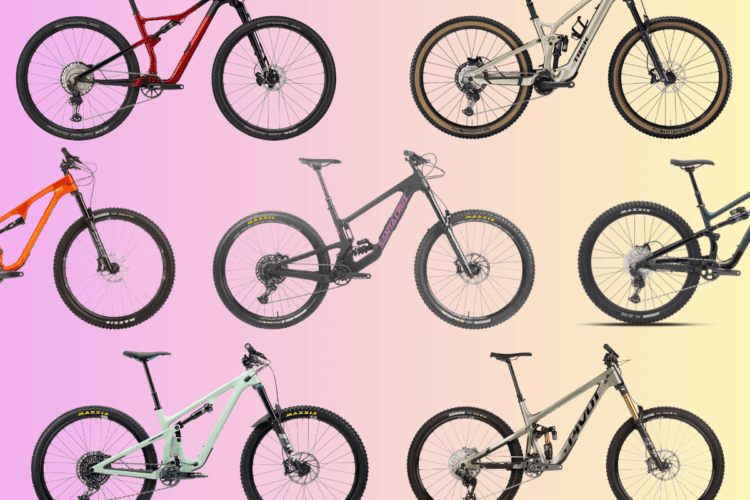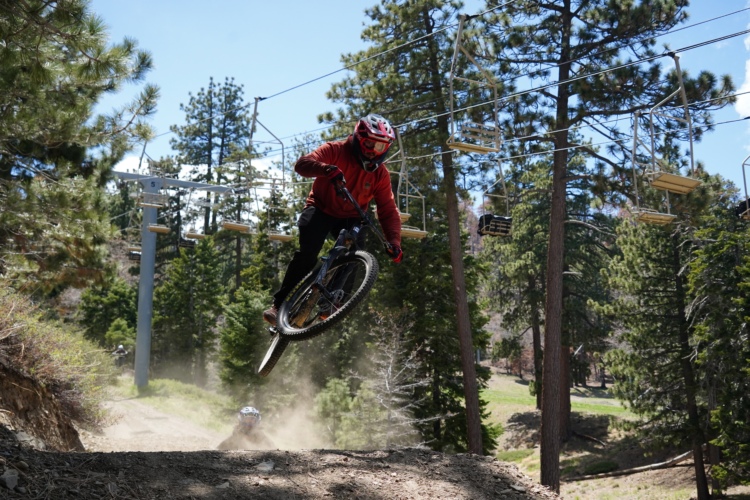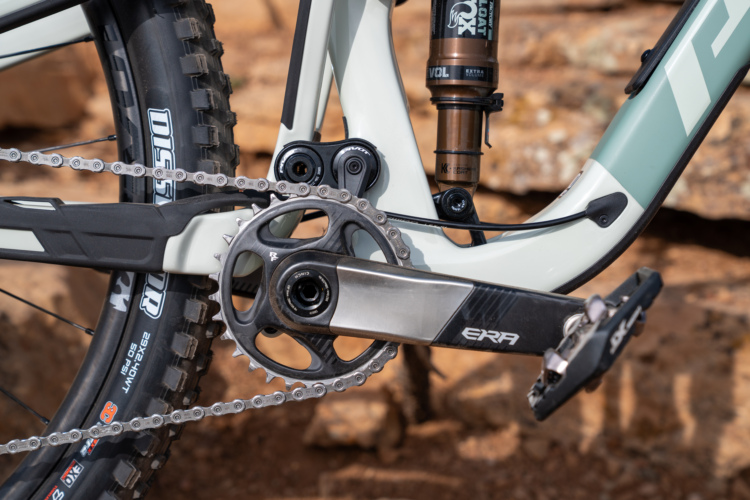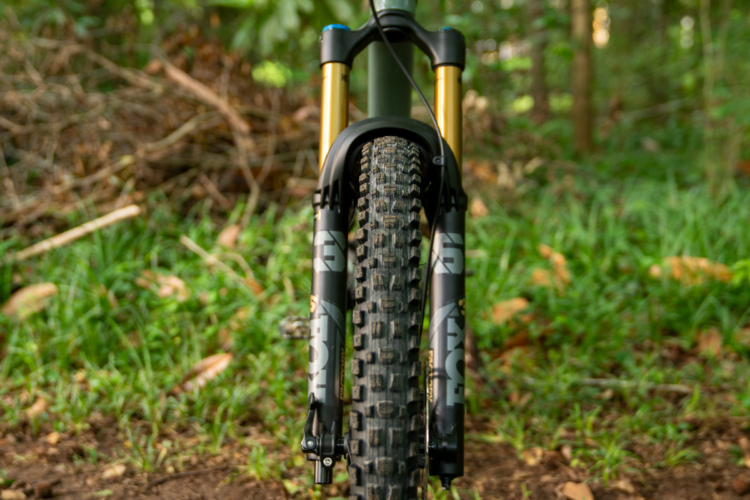
When I first heard that Deuter’s Trans Alpine Pro 28 pack was coming my way for review, I’ll admit that my very first question was “Who’s Deuter?” I’d never heard the name in a sentence up until that point, and certainly not in the context of a market filled with power players like CamelBak, Osprey, and Dakine. The first thing I did before my review was research just what kind of a company Deuter is.
As it turns out, the Germany-based company is the granddaddy of all modern pack manufacturers. Since the turn of the century, Deuter has produced reliable packs, and their impressive track record is a testament to their products’ quality. The first ascent of the north face of the Eiger and of Nanga Parbat, the ninth-highest mountain in the world, are just a couple things that mountaineers have accomplished with Deuter gear according to Deuter’s website. The company has produced biking-specific packs since 1990, and are definitely not new to the game.
With such a robust portfolio, my hopes for the Trans Alpine Pro were high. Its purpose to provide storage for longer rides seemed to perfectly fit in with the type of products Deuter makes so well: equipment for awe-inspiring journeys through earth’s wildest and most unforgiving places. Only a test would determine if it lived up to the hype.
The Numbers
- Weight: 1644 grams (3 lbs. 10 oz.)
- Volume: 28 liters
- Height: 21 inches
- MSRP: $195, available at Amazon and Chain Reaction
The Specs
Deuter equipped the Trans Alpine Pro with every technology at their disposal to make epic backcountry expeditions great.

The pack features three main pockets for storage, which makes it easy to organize gear into different categories. There are plenty of pouches and zippers inside of those pockets for further partitioning, tool organization, or if you want to keep a few items close at hand. To ensure that riders have enough water to keep well hydrated between water sources, Deuter includes two bladder pouches: one in the main pocket and another in the middle pocket, though the middle pocket does not have a direct way to get the bladder hose to the shoulder straps. When I drank through my first bladder, I needed to exchange it for the second.
What most often irks me about packs, in general, is the accessibility of the items deepest in the pack. Like a few other companies, Deuter solves this problem by placing a robust zipper at the bottom of the pack. This guarantees access to a spare tube or multi-tool from the bottom of the pack even if the Trans Alpine Pro is packed to the gills.

The pack is equipped with Deuter’s Airstripes technology, which is designed to dissipate heat and foster airflow to reduce sweat. A light internal frame prevents the pack from folding up under weight, a nice touch for those looking for a trusty bikepacking bag, and a robust hip belt keeps the pack’s weight off the rider’s shoulders. If you do need to sling your bike on your back for a hike-a-bike, the shoulder straps are made of anti-slip and anti-abrasion material to minimize discomfort.

Overall, the painstaking attention to detail in this pack’s design impressed me the most. For example, while I was checking out the bottom zipper, I came across another hidden pouch which contains a rain cover. I also found a guide printed on the inside of the middle pocket. To prevent a trailside emergency from spiraling out of control, the guide includes multiple emergency numbers for various European and North American countries, instructions on how to signal a helicopter, and ways to call for help. Once again, Deuter provides a key feature to make backcountry travel that much easier and safer. Lastly, Deuter includes a regular helmet carrier and a sunglasses holder on the left shoulder strap, which is a welcome addition for keeping track of eye protection.
On the Trail

While riding, I noticed how the Trans Alpine Pro’s comfort helped ease long days in the saddle. Its thick hip belt enabled me to slacken the shoulder straps to free up my shoulders, and Deuter’s Airstripes technology kept my back from feeling sweaty or hot. In fact, the Airstripes worked so well at venting my back that after a vigorous couple months of testing, the pack doesn’t even have a trace of sweat’s sour stench. Other packs I’ve worn, including my usual pack, haven’t been so lucky.
Additionally, the Trans Alpine Pro’s sheer amount of storage space is impressive. With 28 liters of capacity, it was overkill on many of the small trail systems here in southeastern Wisconsin, but small trail systems aren’t the Trans Alpine Pro’s natural habitat. It’s a specialized tool for big rides.
One day, with that in mind, I decided to test just how much the pack could hold. I pulled down my backpacking backpack from the attic, gutted its supplies, and started filling the Trans Alpine Pro. I fit almost everything, including a tent, two days worth of food, tools, clothes, etcetera; everything except for my sleeping bag and stove. Then when I rode with it the next day, the robust build of the pack allowed me to hit turns, smash rock gardens, and even catch air as I pleased. The pack stayed centered, and I never felt as if it was weighted unevenly.

Packs can also scrunch up or bulge if you overstuff them, which can lead to an awkward and uncomfortable riding experience. Deuter equips the Trans Alpine Pro with a light steel internal frame to give structure to the pack, taking care of this problem. Yes, this makes it heavier than other packs, but the ability to efficiently pack gear outweighs the negligible weight gain for me.

The two features Deuter places near the bottom of the pack — a rain cover and a zipper to access the bottom of the main pocket — soon became my favorites. I quickly donned the rain cover and saved my gear during a particularly wet ride on Georgia’s Stanley Gap Trail. Deuter’s cover essentially functions as a massive shower cap, so it is easy and intuitive to deploy without a fuss. The bottom zipper was always appreciated, saving time and my sanity when I only wanted to get a tool out of the bottom of a full pack.

The only two things about the Trans Alpine Pro that didn’t set me on fire were its hydration system and the time needed to properly adjust the pack.
The Trans Alpine Pro doesn’t include a hydration reservoir. That’s wasn’t a problem for me because I already had a reservoir laying around, but its something to kept in mind if you can’t spare one. Also, it was easy to put in a reservoir and feed the tube out of the back of the pack, but it feeds directly out of the middle. Initially, I needed to fiddle with the hose a bit to make sure it didn’t rub against my neck.
On my first couple rides with the pack, the top hit the back of my head every time I took on a big rock garden or sent a jump. The pack also tended to put pressure on the back of my head during steep descents. I found that since the pack is so large, I couldn’t ballpark adjust it like other packs. If it was too loose, it knocked my head, and if it was too tight, it wouldn’t feel comfortable.
In the end, playing the adjustment game paid off. Once I nailed down the fit, I could take on any trail with any load, and the pack would stay firmly centered on my back.
Final thoughts

While $195 may seem expensive, that’s $195 worth of comfort, adaptability, and reliability to count on. This bag won’t fail you in the wild. Just don’t think you’ll be able to take it right out of the packaging and have fit it perfectly.
Putting that $195 to work, the Trans Alpine Pro provides a breathable and durable construction to open up and take the weight off your back. Deuter has also designed a remarkably organized bag considering how much stuff can fit in it. Lastly, their minute attention to detail has created awesome features that make backcountry travel just that much better.
- Buy: available at Amazon and Chain Reaction
- Compare Prices: Deuter Trans Alpine Rucksack
Overall, this is a good pack for those eager to head deep into the wild with only their bike, their wits, and a good bag to support them.
Thanks to Deuter for providing the pack for review.











1 Comments
Jun 17, 2019